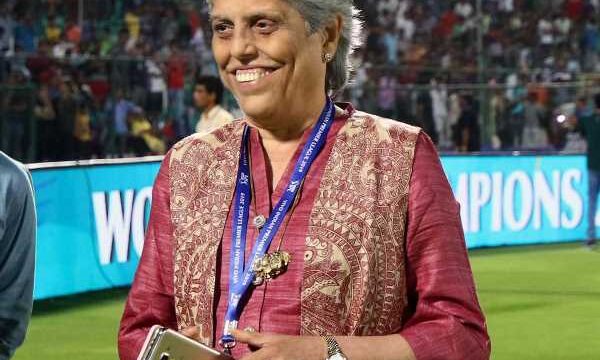India women’s cricket great Diana Edulji, former batting star Virender Sehwag along with Sri Lanka great Aravinda de Silva were named as the latest inductees into the ICC Hall of Fame as the Class of 2023.
The three players will be added to the prestigious ICC Hall of Fame, which honours the greatest international cricketers throughout the long history of the sport.
De Silva, Edulji and Sehwag will join as inductees number 110, 111 and 112 respectively will be inducted in a special on-field ceremony at the Wankhede Stadium, Mumbai during the first semi-final of World Cup 2023 between India and New Zealand on Wednesday.
Edulji becomes the first Indian female inducted into the ICC Hall of Fame thanks to a 17-year international playing career and her pioneering role in establishing the most successful domestic team in Indian women’s cricket history.
Sehwag was also a pivotal figure in the World Cup winning campaign for India in 2011, and his record-breaking career spanned 14 years and over 17,000 runs in international cricket.
De Silva enjoyed a 19-year international career for Sri Lanka, notably playing a starring role in their memorable run to victory at the World Cup in 1996.
“At the outset, I would like to thank the ICC and the jury for having selected me to be inducted in the ICC Hall Of Fame 2023,” said Edulji.
“It indeed is a great honour to be the first Indian women’s cricketer to be inducted and join a galaxy of cricketers, male and female from across the world. I am delighted to be considered for this award. It’s not only a proud moment for me, my family and friends but also for BCCI and Indian Women’s Cricket.”
“I feel extremely grateful for having spent a great part of my life doing what I loved most, ‘hitting the cricket ball’. I would also like to thank my family, friends, people I played with, and countless people who prayed for me selflessly,” said Sehwag.
Meet the ICC Hall of Fame Class of 2023:
Diana Edulji
20 Tests – 404 runs, 63 wickets at an average of 25.77
34 ODIs – 211 runs, 46 wickets at an average of 16.84
Edulji was a trailblazer who enjoyed a 17-year international career, and was arguably the first great female cricketer produced by India. A right-handed batter and slow left-arm bowler, only two women have taken more Test wickets, and none have bowled more deliveries.
She played in three ICC Women’s Cricket World Cups, captaining India in 1978 and 1993, taking 14 wickets in the latter tournament. She struck a half-century in just her second Test, and her best bowling figures were 6-64 against Australia at Delhi eight years later.
However, her sphere of influence extended beyond the field of play. In 1984, she convinced the Railways Minister to field a women’s cricket team, and subsequently Railways became the most successful side in Indian women’s cricket. She won 11 national titles for Railways to add to the three she had previously won with Mumbai.
By the time she retired after the 1993 World Cup, only Lyn Fullston had taken more wickets in all forms of international cricket.
Virender Sehwag
104 Tests – 8,586 runs at an average of 49.34, 40 wickets
251 ODIs – 8,273 runs at an average of 35.05, 96 wickets
19 T20Is – 394 runs at an average of 21.88
Originally a middle-order batter, Sehwag struck a century on his Test debut against South Africa and was soon moved up the order by India’s captain Sourav Ganguly. He revolutionised the opener’s role in Test cricket and ended up scoring more runs at a greater rate than anyone in Test history.
Sehwag brought up India’s first Test triple-century in March 2004 with a six against Pakistan, and four years later he again passed the 300 mark against South Africa at Chennai from just 278 balls. He almost made it three Test triple centuries the following year, but fell seven runs short against Sri Lanka at Mumbai.
Sehwag set a record ODI score of 219 against the West Indies in 2011, which stood for three years, and was instrumental in India’s march to victory in the Cricket World Cup in 2011, striking 175 in the opening game against Bangladesh and displaying his trademark explosive approach by hitting boundaries from the first ball of India’s innings on five separate occasions.
Aravinda de Silva
93 Tests – 6,361 runs at an average of 42.97, 29 wickets
308 ODIs – 9,284 runs at an average of 34.90, 106 wickets
De Silva made his Test debut at Lord’s in 1984, and scored 75 as Sri Lanka recorded the first Test win in their history a year later, defeating India at Colombo. A first Test century followed against a Pakistan attack of Imran Khan, Wasim Akram and Abdul Qadir at Faisalabad the following month, and in 1991 he struck a then-national record individual score of 267 against New Zealand at Wellington.
The all-rounder was instrumental in Sri Lanka’s World Cup winning campaign in 1996, and his contributions during a memorable Final against Australia in Lahore are written in cricket folklore. De Silva took three key wickets with his off-spin to restrict Australia’s score, before scoring an unbeaten 107 to navigate his side out of trouble to win their maiden global crown. He was the first to score a century and take three wickets in the same World Cup match – and is still the only one to do so in a Final.
He signed off from Test cricket in 2002 with a double-century in his final innings and retired from all international cricket after the World Cup in 2003.
Source: Read Full Article


